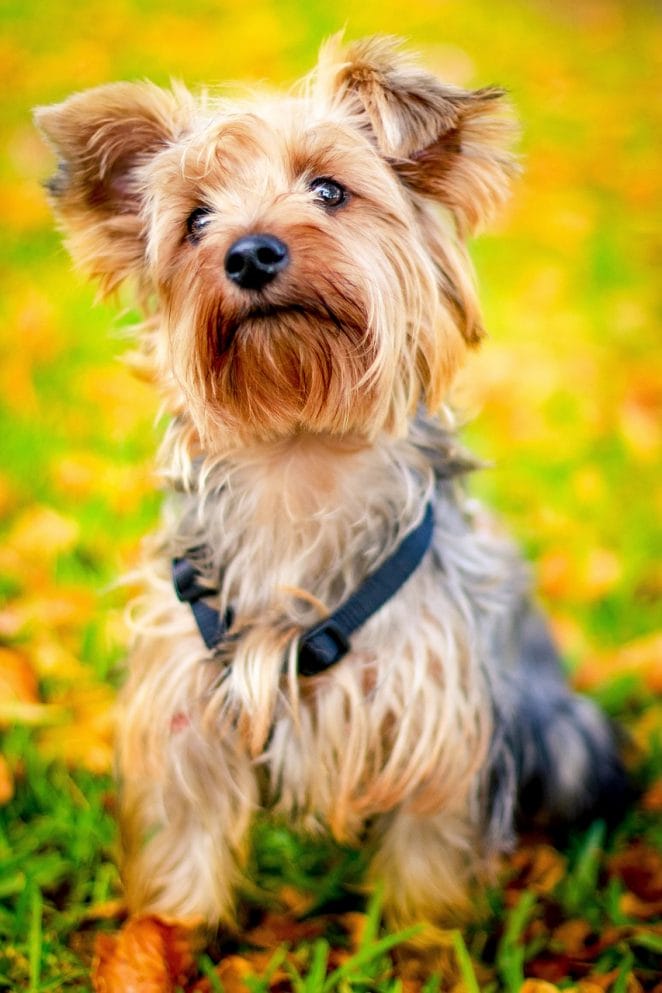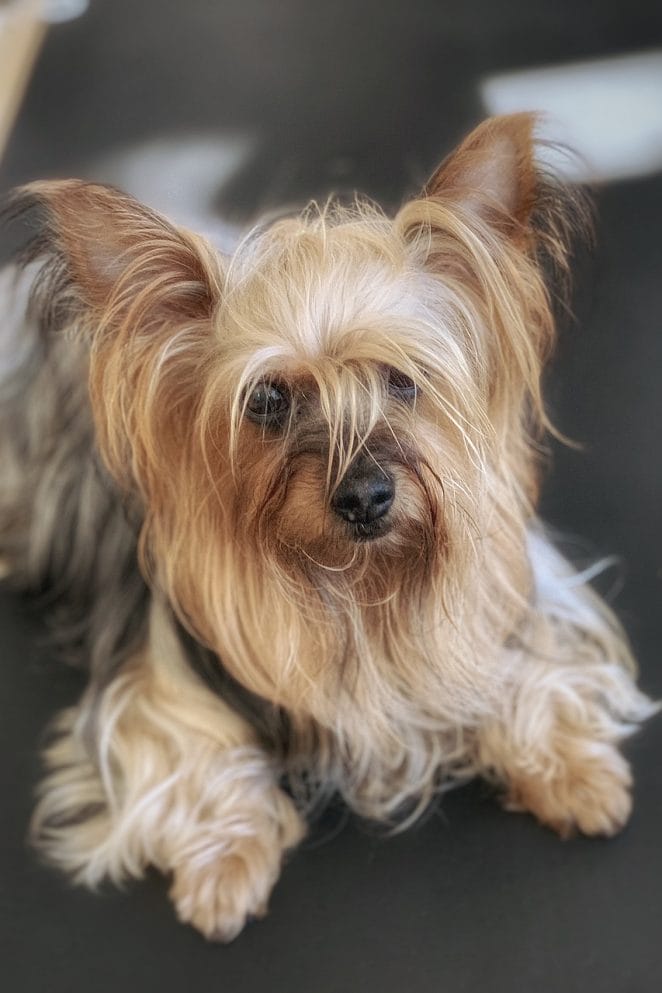
Yorkie Puppy Care Tips is essential. When caring for a Yorkie puppy isn’t overly challenging. Love and attention are crucial for their well-being. Despite their delicate appearance,
Yorkie puppies aren’t as fragile as they seem. However, they do require special affection and attention to ensure they thrive happily and healthily.
If you’re wondering how to do your Yorkie Puppy Care Tips, here are some essential points to remember:
Always Use a Harness for Walks when Yorkie Puppy Care Tips
Once your puppy has completed all their necessary vaccinations, it’s time to venture outdoors for daily walks and outdoor activities.
However, before you embark on these adventures, ensure you have the appropriate accessories, including a harness vest instead of a collar.
Yorkshire Terriers, like many toy breeds, are prone to tracheal collapse, a condition that can severely affect their breathing and overall health.
This issue arises from weakened tracheal rings and is exacerbated by the use of collars, which directly pressure the neck during walks or when the dog pulls on the leash.
If you’re a Yorkie owner, consider opting for a harness over a collar can mitigate this risk.
A harness distributes pressure across the chest, shoulders, and back, reducing the likelihood of tracheal problems and offering a safer, more comfortable walking experience for your puppy.
Prevent Jumping from High Places
Preventing Yorkshire Terriers from leaping from elevated surfaces is crucial.
Small breeds, in particular, are prone to injuries from jumping due to their diminutive size, which subjects their joints and bones to greater impact forces upon landing.
This risk is heightened in puppies, whose developing bones and joints are more susceptible to damage.
High-impact jumping can result in fractures, dislocations, and developmental joint issues, potentially leading to long-term health complications such as arthritis or patellar luxation, conditions that disproportionately affect smaller breeds.
Common jumping points for Yorkie puppies include sofas, chairs, and their owners’ beds. If you allow your Yorkie on furniture like this, ensure close supervision.
An alternative approach is to utilize pet stairs or ramps, such as the Sweetbin Adjustable Pet Ramp, to provide safe access to elevated areas and mitigate the risks associated with jumping.
These aids are particularly beneficial for puppies, whose developing bones and joints make them more vulnerable, as well as for older dogs, who may suffer from arthritis or other age-related ailments.
Get Ready for the Teething Phase

Preparing for the teething stage in Yorkshire Terrier puppies is a vital aspect of puppy care that new pet parents should anticipate in advance.
This phase typically commences around 3 to 4 months of age and can persist until the pup reaches about 7 to 8 months old, marking the transition from their puppy teeth to their adult set.
At the outset, a Yorkshire Terrier puppy will possess 28 deciduous (baby or milk) teeth, eventually replaced by 42 adult teeth.
During this period, your puppy may encounter discomfort or itchiness, prompting an increased inclination to chew on various objects to alleviate their gum irritation.
To safeguard your household items from being gnawed upon, ensure ample provision of appropriate, safe teething toys designed to endure persistent chewing.
Look for toys with small nubs that offer relief to itchy gums, and consider those that can be frozen to alleviate swollen gums.
One recommended option is the Petstages Mini Dental Chew Starter Pack, comprising three different toys designed for wetting and freezing the fabric pieces, thus offering ideal relief for teething discomfort.
Start Training Early
Yorkshire Terriers may be small in stature, but they possess larger-than-life personalities and a degree of stubbornness that can present challenges during training sessions.
Introducing obedience training during puppyhood is advisable, as it fosters good manners and helps mitigate potential behavioral issues.
Dedicate time to teach fundamental commands such as ‘sit,’ ‘come,’ and ‘down.’
Utilizing positive reinforcement techniques is paramount to effectively train your Yorkie.
Rewarding desired behaviours with treats, praise, and play fosters cooperation and strengthens the bond between you and your puppy, ensuring they mature into well-behaved and sociable companions.
House training is another crucial aspect of early training that warrants attention.
Yorkshire Terriers, like many small breeds, may present difficulties in housebreaking, but with consistency and patience, they can learn swiftly.
Establish a consistent schedule for feeding and potty breaks to aid your puppy in developing a routine.
Promptly praise and reward your Yorkie when they eliminate in the designated spot to reinforce positive habits.
Follow Puppy Feeding Guidelines

Ensuring young puppies have continuous access to food is essential to prevent hypoglycemia, a common concern in toy breeds like Yorkshire Terriers.
This unrestricted access guarantees they receive the necessary nutrients for their rapid growth and helps ward off symptoms such as lethargy, weakness, and, in severe cases, seizures.
As puppies reach around 4 months of age, transitioning them to a structured feeding schedule of three meals a day with ample healthy snacks in between is advisable.
This adjustment supports their developmental needs while establishing a consistent routine.
Dry kibble is recommended for puppies as it promotes dental health by aiding in teeth cleaning and reducing tartar buildup.
When choosing kibble, snacks, and treats for your Yorkshire Terrier, prioritize products made in the USA, where quality control standards are typically higher.
Opt for brands free of artificial additives, colouring, food dyes, or chemical preservatives, as these ingredients can lead to digestive issues, allergic reactions, and potentially more severe health complications.
Final Thoughts
In conclusion, Yorkie puppies thrive on love, affection, and proper care.
Their need for nurturing extends beyond mere physical necessities, as they yearn for the comforting touch of a caring hand on their heads.
When provided with the attention and affection they crave, Yorkies can blossom into remarkable companions, enriching the lives of their owners with their endearing personalities and unwavering loyalty.
By ensuring they receive the care and attention they deserve, Yorkie puppies can indeed become cherished members of the family, bringing joy and companionship to all who welcome them into their homes.
Yorkie Puppy Care Tips Related Frequently Asked Questions
Puppies of Yorkshire Terriers require a lot of sleep, usually 16 to 22 hours a day, to support their quick development. Puppies naturally sleep in this way, which is important for their health since it promotes healthy brain development and helps them conserve energy during growth spurts. Make sure they can slumber peacefully and comfortably somewhere.
Though it may be tempting, it is best to wait until your Yorkie puppy is older and completely housebroken to allow them to sleep in your bed to avoid accidents. Setting up a distinct resting space, such as a comfortable bed inside a dog playpen, early on can help create boundaries and facilitate training. It also lessens the possibility that the puppy may sustain accidental harm while you sleep.
One little toy breed is the Yorkshire Terrier. While mature Yorkies should weigh no more than 7 pounds according to breed standards, most pet Yorkies weigh less than 10 pounds.
As they grow older, Yorkie puppies frequently change coat colour. This change typically occurs at six months of age and can last up to a year. It is typical for them to progress from black and gold to blue and tan throughout this phase of development, with the colour of their adult coat gradually becoming more noticeable.
Puppies’ bad breath is frequently linked to the teething process and is caused by a combination of saliva and blood that is produced as new teeth erupt and old ones fall out. It’s critical to practice proper oral hygiene from a young age, which includes routine brushing and examinations. Giving them the right chew toys can also aid in maintaining dental hygiene and minimizing foul breath.
For Yorkies, we advise an indoor dog playpen rather than crate training. This gives them more room to walk around, which lessens claustrophobia. It also works just as well to control separation anxiety and confine them safely when left alone.


GIPHY App Key not set. Please check settings